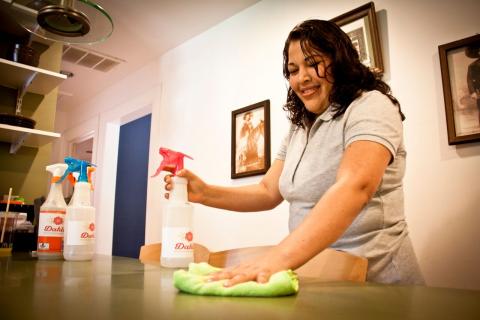Cooperation Texas is a nonprofit, Austin-based incubator for worker-owned cooperatives that provides education, training and technical assistance. Since its creation in 2009, it has been committed to cooperative development, support and promotion. Cooperation Texas provides services through two main programs:
- The Cooperative Business Institute, which offers 50+ hours of training and consultation that includes background on co-op history and principles; marketing assistance and website development; training in democratic governance, management, facilitation and conflict resolution; and legal assistance on forming a worker cooperative in Texas.
- Education for Cooperation, which focuses on outreach within institutions like churches and schools to conduct participatory workshops in English and Spanish on cooperatives for low-income community members. It also develops relationships with stakeholders like the church to assist in access to capital, and with immigrant- and labor-focused groups to widen the network for professional services for potential cooperatives that develop.
Origin and Mission
The seeds for Cooperation Texas were sown when a small group in Austin wanted to develop the idea of a worker co-op that was explicitly conceived of as "led, founded by and designed for people of color in the city for dignified jobs in the city." Given the group's working experience in the service industry, it settled on creating a worker-owned café, meeting regularly for about a year, writing a business plan, and seeking out financing. However, in 2009 when the economic recession hit, the financing that was secured froze up.
Co-director Carlos Pérez de Alejo relates how "a couple of us on the steering committee stepped back, and said, 'We're still committed to doing something around worker cooperatives and responds to increasing inequality, especially as it affects people of color and the racial wealth divide.'" The idea for an incubator developed as a result, after discussing "how daunting it would be to start from scratch, with nowhere to turn in the state of Texas for expertise in starting a worker cooperative." Today, Cooperation Texas has helped launch three cooperatives with one more on the way: Red Rabbit, a vegan worker-owned bakery of 10; Dahlia, a green housecleaning cooperative of four undocumented Latina immigrants; and Fourth Tap, the country's first worker cooperative brewing company.
Lessons for Community Wealth Building
Use tools and experience from community organizing for community development: Both of Cooperation Texas's executive directors have a wealth of experience in community organizing. Pérez de Alejo helped create a community-organizing training center called Refugio, which brought African-American and Latino community members together to build up organizing skills. Lessons, curricula, facilitation skills have all been honed through years of experience in organizing, and in particular, applying the philosophy of popular education, articulated by theologian Paulo Freire. Cooperative development has been helped through Cooperation Texas's partnership with the Workers' Defense Project, which has helped recruit and refer participants to its trainings.
Build mutual support as a conscious goal within the community: When Fourth Tap had its graduation, Red Rabbit and Dahlia worker-owners came out to support them. When Dahlia graduated, Red Rabbit donated donuts. When members of Fourth Tap see Dahlia worker-owners, they want to interact with them despite large language, cultural and socio-economic differences. This is part of Cooperation Texas's explicit aim at "long-haul culture building" within the cooperative economy of Austin, Texas. This is seen in the fact that Gaia Host Collective (a worker co-op) is Dahlia's web provider; MonkeyWrench, a collectively run bookstore which Carlos was a part of, hosted weekly beer socials for Black Star Co-op Pub & Brewery before the member cooperative and democratic workplace found its own space. Black Star now purchases Red Rabbit baked goods, as does a large food co-op, Wheatsville, which serves as an anchor purchaser.
Education as a collaborative process: A guiding principle to capacity building for Cooperation Texas is that "folks who are directly impacted should be leading process and brought in and put in positions of leadership." At the Cooperative Business Institute, "a lot of curriculum is influenced by popular education," says Carlos. "We weren't coming in and saying we are the experts, you are the empty vessels, we deposit knowledge and you go forth and develop cooperatives." The learning process is mutual and the curriculum changes all the time, and is built on investigating daily issues to connect participants with the role of cooperative business by guiding questions around who owns their current company, who are their bosses, and coming to solutions through shared analysis. This process is also arrived at through unconventional and artistic means, such as drawing, singing, acting, and other interactive and sometimes playful methods.
